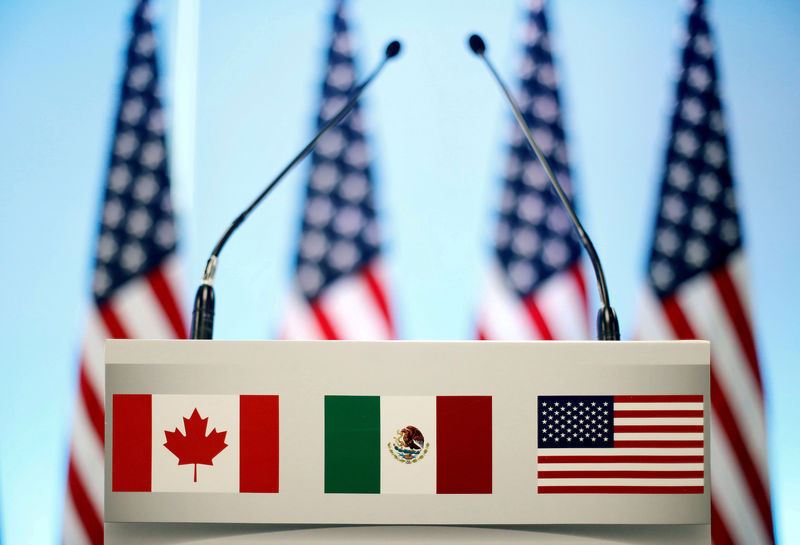 © Reuters. FILE PHOTO: The flags of Canada Mexico and the U.S. are seen on a lectern before a joint news conference of NAFTA talks in Mexico City
© Reuters. FILE PHOTO: The flags of Canada Mexico and the U.S. are seen on a lectern before a joint news conference of NAFTA talks in Mexico CityBy David Ljunggren
OTTAWA (Reuters) – With little time left ahead of a deadline to agree to a renewed NAFTA, Canadian and U.S. trade officials on Sunday tried to settle differences on tough issues such as protection against American tariffs.
The administration of U.S. President Donald Trump said Canada must sign onto the text of the updated North American Free Trade Agreement by midnight EDT on Sunday (0400 GMT Monday) or face exclusion from the trilateral pact, which includes Mexico.
NAFTA underpins $1.2 trillion in annual trade and markets fear its demise would cause major economic disruption.
Two Ottawa sources directly familiar with the talks said a deal could be very close but stressed some challenging matters had yet to be solved.
White House trade adviser Peter Navarro on Sunday said everyone involved was working in good faith and reiterated the Sunday deadline.
“It’s either going to be the text goes in with Mexico and the U.S. or the text goes in with all three countries,” he told the Fox News Channel.
U.S. business groups oppose turning NAFTA into a bilateral deal because the three nations’ economies have become closely intertwined since the original pact came into force in 1994.
Officials though have blown through several deadlines since the talks started in August 2017 and a third Canadian source said that if the two sides were close enough at midnight, negotiations could spill over into Monday.
Negotiators – still apart on matters such as dispute resolution and a U.S. demand for more access to Canada’s dairy markets – are also tackling the matter of American tariffs.
Trump has already imposed tariffs on Canadian aluminum and steel, citing national security, and is threatening similar punitive measures against auto exports. Canadian Prime Minister Justin Trudeau said it makes no sense to sign onto a new NAFTA only to be hit by new tariffs and is seeking safeguards.
“It’s a challenging task to figure that out and they’re spending a lot of time on that right now,” said the third Canadian source.
One solution might be to imitate the provisions of the bilateral Mexico-U.S. deal on NAFTA.
The two nations signed a side letter allowing Washington to pursue tariffs on annual Mexican car and SUV imports of over 2.4 million vehicles, a number that significantly exceeds last year’s total. The Mexican government said the letter provided insurance that gave the auto industry scope to grow.
A fourth Canadian source directly familiar with the negotiations said any suggestion Ottawa would accept a cap or quota on autos exports was completely inaccurate.
The office of Canadian Foreign Minister Chrystia Freeland did not respond to requests for comment.
Fusion Media or anyone involved with Fusion Media will not accept any liability for loss or damage as a result of reliance on the information including data, quotes, charts and buy/sell signals contained within this website. Please be fully informed regarding the risks and costs associated with trading the financial markets, it is one of the riskiest investment forms possible.
Source: Investing.com


























